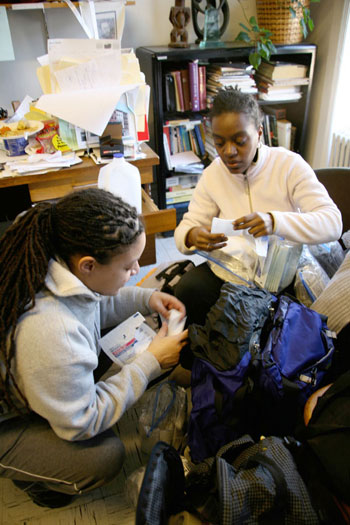

Vol. 74/No. 7 February 22, 2010

|
| Kara Fox/IFCO Pastors for Peace |
| Melissa Mitchell, left, and Nyla Manning, U.S. graduates of Cuban medical school, prepare for trip to Haiti to join Cuban doctors treating Haitian earthquake victims. |
“These dedicated and skilled young doctors are ready to serve,” said Rev. Lucius Walker, executive director of IFCO, which administers the U.S. student scholarship program for ELAM. “They received their M.D. degrees in Cuba and they are uniquely prepared for the multiple challenges of this urgent mission.”
Cuban medical personnel, who have been giving free service in Haiti for more than 10 years, were the first to provide aid after the earthquake struck. To date Cuban doctors have seen more than 50,000 patients and performed 3,400 surgeries, according to the Cuban daily Granma.
Dr. Carlos Alberto García, a leader of the Cuban health mission in Haiti, said that many personnel from other countries “have returned home, considering the emergency over. But to us the emergency continues.” Now it is not so much surgery Haitians need, but treatment for infections, malaria, parasites, and typhoid. The goal is to rebuild Haiti’s public health system, “to provide comprehensive care over the long term,” he told Gail Reed, international director of MEDICC, a U.S.-based group that promotes medical cooperation with Cuba.
“The Henry Reeve Emergency Medical Contingent—as the Cuban-led teams are known, named after a U.S. veteran of Cuba’s independence war against Spain—is now working in three hospitals, four field hospitals, five Comprehensive Diagnostic Centers (clinics), and numerous open-air sites in Port-au-Prince and throughout Haiti,” Reed reported.
More Cuban volunteers have arrived to vaccinate Haitians, provide psychological and physical therapy, and fumigate. Cuban teachers are offering classes for children in a tent city set up by the governments of Venezuela, Cuba, Bolivia, and other countries that are part of the Bolivarian Alternative for the Peoples of Our America. The encampment shelters 700 people and provides food and medicine.
Elsie Walter, one of the U.S. medical graduates, told Granma International that they “felt the need to be here. We’re leaving aside our studies” to do so. She expects more Cuban-trained students to come later, “because we know the Cuban medical brigade is going to be here for a good long time.”
Cuba’s Latin American School of Medicine initially opened to offer full, six-year scholarships to students from Latin America on the condition that they return to their countries upon graduation to practice medicine. Some 530 Haitian youth have graduated from the school, and many are currently working with Cuban doctors in Haiti.
Related articles:
How Washington keeps Haiti undeveloped
Debt payments, unequal trade, low pay maintain exploitation of working class
Front page (for this issue) |
Home |
Text-version home